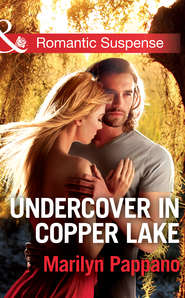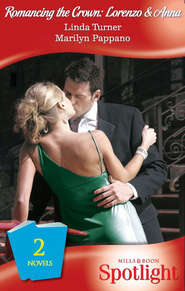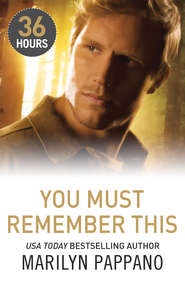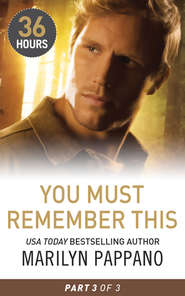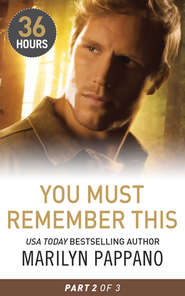По всем вопросам обращайтесь на: info@litportal.ru
(©) 2003-2025.
✖
The Truth About Tate
Автор
Год написания книги
2019
Настройки чтения
Размер шрифта
Высота строк
Поля
Tate followed him onto the porch. It was a miserable day. The heat index had climbed past 110 for eighteen days in a row, they hadn’t had rain in more than a month, and things were likely to get worse before they got better. Hell had nothing on Oklahoma in August.
Josh rested his hands on the rail cap and stared at the horses in the pasture across the yard. “Look, I know you don’t want to do this. I know it’s sneaky and underhanded. But she’s not exactly playing fair, either. I told her I wanted no part of her project. I told her politely, and I told her rudely, and she’s coming here, anyway. I don’t owe her anything else. Mom for damn sure doesn’t owe her anything. Now it’s time to look out for our best interests.”
For an instant the tightness in Tate’s chest made it difficult to breathe. Lying to a stranger, impersonating his brother—it was wrong, and he wouldn’t consider it for an instant if his brother’s privacy and his mother’s reputation weren’t at stake. If his son weren’t at risk of getting tarnished by the same brush.
But Natalie Grant was nothing if not persistent. She’d been harassing Josh for months, wanting his cooperation for her book. She’d called. He’d turned her down, hung up on her and ignored her messages. She’d written, and he’d written back once—“No, thanks, not interested”—then returned her following letters unopened. But none of that had stopped her from making the trip from Montgomery to Hickory Bluff.
And why shouldn’t she be persistent? Given Chaney’s political power, his wealth, his family’s penchant for scandal and the American people’s penchant for gossip, her book was bound for the bestseller lists. She stood to make a nice chunk of money by exposing Tate’s family to ridicule.
But maybe he could minimize the damage.
As if he sensed Tate was wavering, Josh asked, “How much effort do you think Ms. Alabama will make to be fair? He handpicked her to write the book. You can be damned sure everything will be skewed to make him out to be the good guy. She’ll say Mom—” With a glance toward the house, as if Lucinda could hear through the solid walls, he broke off. But he didn’t need to go on.
Tate had only one memory of the illustrious senator. He’d been about five years old when Chaney had come to their apartment in Montgomery. The election was coming up, and he’d brought money to persuade a very pregnant Lucinda to leave the state and keep the identity of her baby’s father secret. Tate hadn’t understood most of the conversation, or why the man was giving his mother so much money. But he’d never forgotten the ugliness in Chaney’s voice when he’d made one last remark before walking out the door. “Gold-digging whore.” The insult had made her cry, leaving Tate afraid to ask what it meant. Eventually, of course, he’d learned on his own, and he’d hated Chaney ever since.
Josh’s quiet voice pulled him back from the memory. “You think this reporter won’t make it look like Mom made a habit of having affairs with married men, getting pregnant and blackmailing a little cash out of them? And let’s toss in the fact that her older illegitimate son is raising his own illegitimate son. You think she won’t twist that so it reflects badly on you? On Mom? Hell, even on Jordan?”
Though he’d already made his decision, Tate continued to raise objections. “What if she finds out the truth?”
“You put the word out around town that you don’t want anyone talking to her.” The answer came from Jordan, standing in the doorway. Sixteen years old, and already showing his uncle Josh’s talent for deception. “Then make it one of the terms of your agreement, that she can only ask questions of you and me. Not Grandma, not the neighbors, not anyone who knows us.”
“And if she agrees to that, I’m supposed to trust her to keep her word?” A writer snooping around in people’s private lives didn’t strike him as the best candidate to trust. Anyone working in any capacity for that bastard Chaney couldn’t be too upright in the morals department.
“We won’t let her go into town alone.”
Tate shook his head as Jordan came closer. “There’s no ‘we’ in this. I don’t want you involved. You stay away from her, don’t talk to her and—”
“Dad, I live here, and unlike Josh and Grandma, I can’t leave. I’ve got football practice. Besides, I’m old enough to watch what I say.”
“You can’t go to Grandpop’s, but you can stay with Steve while she’s in town.”
“Aw, Dad…” Suddenly he grinned. “You need me here as a chaperon. Grandma and I think it would be a good idea if she stays here. That way we can watch her and you won’t have to trust her to keep her word.”
Josh slapped Jordan on the back. “Good thinking. Keep her on a short leash and control everything she does.”
“I don’t want her staying here,” Tate protested. Inviting a strange woman into his house? Sharing a bathroom with her? Letting her sleep in the empty room between his and Jordan’s rooms? Worse, giving her free run of the house while they were working?
“Not here,” Jordan replied, gesturing toward the house. “At Grandma’s. She’ll lock away all her personal stuff so there won’t be anything for her to snoop through. Besides, the nearest motel is twenty miles away. If you make her stay there, she’ll spend half her time driving back and forth.”
Tate turned to look at his mother’s quarters. The two houses shared a roof, but were separated by a broad deck with flower beds all around. It was a great place for cooking out, watching storms or just kicking back, and gave them at least the illusion of privacy.
“What do we care if she spends half her time commuting?” he asked as he turned back to Jordan and Josh.
The two of them exchanged a damn-he’s-slow sort of look, then Jordan explained. “The more time she’s out without one of us, the more chances she has of meeting other people, and the more people she gets to know, the more likely it is that she’ll start asking questions and they’ll start answering them. A stranger asking questions is one thing. A friend is different.”
The floorboards creaked as Tate moved to lean against the rail. Sweat was trickling down his back, his stomach was queasy, his head was starting to ache, and it was so damn hot. Better get used to it, though, because he was going to hell.
He was an honest man. He’d never cheated on a test, his taxes or a woman. He’d accepted every responsibility that ever came his way, whether he was ready for it or not. For thirty-four years, he’d lived right, loved well—if not always wisely—and earned a reputation a man could be proud of. But if he agreed to this fool-minded scheme, he was surely going to burn in hell.
He took a deep breath of dry air that seared his lungs, then faced Jordan and Josh. “All right.” The words were stiff and reluctant. There was nothing he wouldn’t do for his family. They’d never had a lot, but they had each other, and that was all that mattered. When one was in trouble, they all were. When one needed help, they all gave it. It was how they’d lived their lives, how they always would.
But that didn’t mean he had to be happy about the help he was giving this time. “I’m sure I’ll live to regret it, but…all right. Let’s get our stories straight and see if I can pull this off.”
And if he did, or even if he didn’t, he would surely burn in hell.
But maybe he could take Natalie Grant and Boyd Chaney with him.
Natalie Grant scanned her laptop screen:
Luther Boyd Chaney was born in the heart of Alabama, not far from the Coosa River, in a sharecropper’s shack that let in the rain and the heat and the cold. He watched his father work himself to death, and a few years later saw his mother do the same, and he swore his own life would be different. Seventy-some years later, he’s made good on that vow. He put himself through school, got elected to the Alabama state senate, went on to Congress. He became the confidant of presidents and the unofficial advisor to prime ministers and kings the world over. He was unarguably the most influential man in the last century of American politics.
Muttering to herself, Natalie paged down to a blank screen and started typing again.
It would be difficult, if not impossible, to find an American citizen whose life hasn’t been greatly improved by Boyd Chaney. Every major piece of legislation in the past forty years dealing with education, families and social programs bears the stamp of the senator from Alabama. If he didn’t author it himself, he ensured that it passed into law. From his first Congressional term to his last, he was, first and foremost, an advocate for the American family.
One might expect such an advocate to be a family man himself, but Boyd Chaney doesn’t always do what one might expect. Oh, he married six times and divorced six times, and he had children—nine of them. He knows his children’s names, and their mothers’, but birthdays, ages, occupations, marital status? Not with any degree of accuracy.
With a sigh Natalie pushed the computer away and stood up. She’d slept in until eight, then gone straight to the computer and had written a dozen pages, none of it keeper stuff. Like many reporters, she’d always planned to write a book whenever she found the time. Now she had the time, and the contract, and the full cooperation of the subject and a hundred or so of his nearest and dearest. She had reams of research and thousands of hours of taped interviews. She’d gathered enough material to write a dozen volumes on the senator who’d virtually run the country for all of her life and beyond.
She had everything…except the cooperation of one of the Chaney offspring. That one man’s stubbornness could cost her the project.
It had been a deal-breaker in the negotiations. Upon his retirement from political life, Chaney had chosen her to write his biography, but he’d insisted that she personally gain the cooperation of each and every one of his six ex-wives, nine children and seven grandchildren. She’d known it was a red flag, because he’d already secured agreements from half of them. The other half had signed on readily enough, except for one. The fourth son, the fifth child, the only illegitimate one in the bunch. J. T. Rawlins.
She turned on the water in the shower, then stripped out of her pajamas. She’d tried for months to set up an interview with the elusive son no one had ever heard of. She’d tracked him down in an end-of-the-line Oklahoma town called Hickory Bluff and sent him a letter politely requesting an interview. He’d returned it with a terse note scrawled across the bottom: No, thanks, not interested. She’d called repeatedly. He’d hung up on her. She’d written time and again. The letters had come back unopened.
So here she was, in a cheap motel nineteen miles from Hickory Bluff. She intended to show up at J.T.’s house, to talk to him reasonably, persuasively, to let him see for himself that she wasn’t a threat. She wasn’t looking to disrupt his life any more than was necessary.
Yeah, right, she thought scornfully as she rinsed magnolia-scented suds from her body. She just wanted all the personal details of his life so she could put them in a book for everyone to read. She wanted to announce to the world that his mother had had an affair with a tremendously rich and powerful married man and that he was the best-kept secret of one of the most flamboyant, tabloid-fodder families in the country. What would that do to his reputation, and to his mother’s? How would it affect their relationships with the people currently in their lives?
She was sorry, but she had no choice. She needed this project. She’d already screwed up once, and it had cost her career, her relationship with her family and her own self-respect. This was her chance to recover those things. Failing wasn’t an option.
After rubbing herself dry with a threadbare towel, Natalie quickly dressed. She applied the few cosmetics that were her major effort at looking good, tied her curls back with a strip of ribbon, then gathered everything she needed for a day’s work—steno notebook, ink pens, microcassette recorder, tapes and batteries, 35-mm camera and film, as well as digital camera. It all fit handily in the oversize tote she used for a purse. With sunglasses on and keys in hand, she left her motel room, deposited the laptop in the trunk for safekeeping, then slid behind the wheel of her classic Ford Mustang convertible and headed for Hickory Bluff.
With The Doors blasting on the stereo, she cruised along the two-lane highway at ten miles over the limit and thought about the events of the past fifteen months that, together, had brought her to this place. The award-winning articles she’d written, the accolades and recognition, the jealousy, the scandal and the truth that only she and one other person knew. No one had stood beside her—not her editor, not her best friend of five years, certainly not her father. An entire career of outstanding work had been forgotten, destroyed in one careless moment by the simple act of trusting someone she’d loved. I hope you learned a lesson, her father had unsympathetically told her, and she had. Don’t trust, don’t love, don’t care about anyone or anything except the story. Natalie Grant’s New Rules to Live By.
Dealing with Senator Chaney and his self-absorbed family made them easy to stick to. She hadn’t yet met any Chaney kin that she would give a plug nickel for. For a man who had accomplished so much good in his career, he’d married and helped give life to some of the most beautiful, charming, shallow, irresponsible and worthless human beings she’d ever met. Maybe J.T., being the exception as far as legitimacy went, would also be the exception in other ways, but she wasn’t holding her breath.
At the sight of a large wooden sign up ahead, Natalie slowed and pulled onto the shoulder, stopping twenty feet back. Welcome to Hickory Bluff, it read. Home of the Fighting Wildcats. Class 2A State Champions in Football, Basketball, Baseball. Each sport was listed on a separate line, followed by the years the team had won the championships. Spray-painted in hot pink across the bottom was an afterthought—Lady Cats Rule!
Was J. T. Rawlins an athlete? Had he suited up every fall Friday night in the Wildcats’ green and gold? Did he relive former glories every time basketball season rolled around or each time the crack of a baseball on a bat split the air?
Making a mental note to check the yearbooks for his high school years, Natalie pulled back onto the road and rounded the curve that led into Hickory Bluff. It wasn’t a prosperous town and never had been. Situated at the crossroads of two state highways, it consisted of four blocks of businesses, houses backing them up on both sides of the street and a water tower, painted green and gold and honoring the boys’ teams. There was a church on every block, or so it seemed, and a redbrick schoolhouse, a football stadium and a complex of baseball fields.
She parked in front of a store that announced its services in white letters painted across the plate glass. Hunting, fishing licenses. Ice. Bait. Video rental. Cold beer. Sandwiches. Notions. Driver’s licenses and car tags. Next door to it was her destination—the post office. The building was small, fronted with yellow brick and devoid of personality. If a tornado swept through the downtown area, it would probably take all the old stone-and-glass buildings with it and leave the amazingly unimaginative post office standing untouched.
The plate-glass door led into a room no more than eight feet deep and ten feet wide. Customer boxes filled the two end walls, and a counter took up most of the back wall. There were no customers other than her, and no employees visible other than a white-haired man sorting through a stack of mail. He glanced at her but didn’t speak or stop his work. She waited patiently, assuming that when he finished, he would turn his attention to her.
“Well?” he prodded after a moment. “You plannin’ on standin’ there all day, missy, or is there somethin’ you want?”







